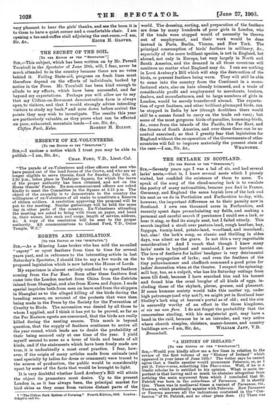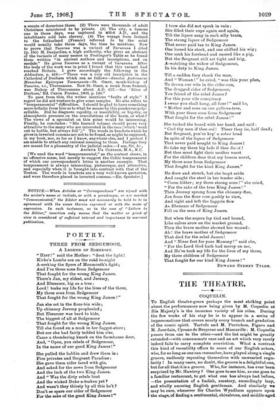"A HISTORY OF IRELAND." [TO THE EDITOR OP THE "SPECTATOR."]
SIE,—Would you kindly allow me a few lines in relation to the review of the first volume of my "History of Ireland" which appeared in your issue of June 13th? The writer says he cannot agree that a Gaelic speaker would pronounce Taburnia, or, as I put it. Taber-i-niae, something like Thor-i-niae. Well, if he is a Gaelic scholar he is entitled to his opinion. What is more im- portant is that having said so much he abstains altogether from noticing the main argument from which I concluded that St. Patrick was born in the suburbium of Taruanna. It is shortly this. There was in mediaeval times a variant of Taruanna, viz., Taverna, which practically equates with Tabernia. Now Taruanna or Taverna answers all the indications contained in the " Con- fession "of St. Patrick, and no other place does. (1) There was senate of decurions there. (2) There were thousands of adult Christians ministered to by priests. (3) The city, a famous one in those days, was captured in 405-6 A.D., and the inhabitants sold into slavery. (4) The voyage from Ireland to the fatherland (France) referred to by the saint would usually take three days, the time he mentions. Now to prove that Taverna was a variant of Taruanna I cited (p. 150) M. Desjardins, a high authority, who gives an abstract of the variants of many names in Peutinger's Table as he found them written "in ancient authors and inscriptions, and on medals." He gives Taverna as a variant of Taruanna. After the body of the work was in print I found that this variant had reached Britain. I gave accordingly the following in the Addendum, p. 418:—" There was a very old inscription in the Cathedral of Durham which ran as follows—Sanctus Audomarus Afonachus Episcopal Tavernensis—St. Omer, monk-bishop of Taverna, i.e., Theronanne. Now St. Omer, a monk from Suxeuil, was Bishop of Therouanne about A.D. 657.—See 'Rites of Durham,' Ed. Canon Forster, 1903, p. 130."
To pass from this, the writer mentions "faults of style." I regret he did not venture to give some samples. He also refers to "temperamental" difficulties. I should be glad to have something more definite from him as to what he means by this ponderous poly- syllable. Did he diagnose rapidity, or irascibility, or bigotry, or atmospheric pressure on the convolutions of the brain, or what? The views of a specialist on this point would be interesting. Finally, he concludes : "His learned volume should prove very attractive to the many who are interested in the race [which 'went out to battle, but always fell']." The words in brackets which he gives in inverted commas are not to be found, as might be supposed, in my book, nor, so far as I know, anywhere else, and I protest I am unable to attach any rational meaning to them. Perhaps they are meant for a pleasantry of the judicial order.—I am, Sir, &c.,
ARTIL1711 17A CLVRIGH, M.A., K.C.
[We used the word "temperamental," as the context shows, in no offensive sense, but merely to suggest the Celtic temperament of which our correspondent's letter is another example. That temperament .is always interesting, picturesque, and attractive, and especially when it is brought into contrast with that of the Teuton. The words in brackets are a very well-known quotation, and were therefore placed in inverted commas.—En. Spectator.]























































 Previous page
Previous page